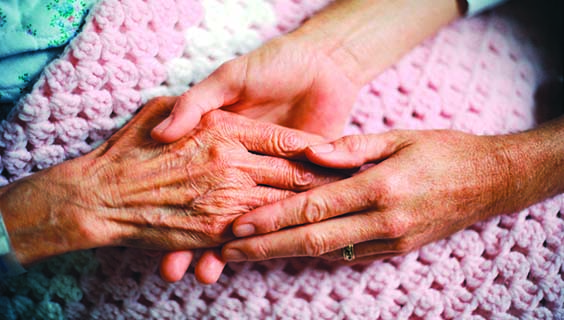Although it can include end-of-life care, palliative care is much broader and can last for longer. Having palliative care doesn’t necessarily mean that you’re likely to die soon – some people have had palliative care for years. End-of-life care offers treatment and support for people who are near the end of their life.
End-of-life care offers treatment and support for people who are near the end of their life. It usually starts to be offered to those who are thought to be in the last year of their life. The aim is to help someone be as comfortable as possible in the time they have left, as well as to make sure that practical things such as Wills or wishes are sorted out.

Who provides end-of-life care?
End-of-life care can be provided by different professionals, depending on where you are living or staying. This could include a nurse, healthcare assistant, caregiver, or staff in a hospital or hospice.
Where is end-of-life care given?
You may have end-of-life care in different places, including
- your home
- a hospital
- a care home or nursing home
- a hospice.
You can talk about where you would like to be cared for by your healthcare professionals. They will try their best to support your wishes, while also making sure you get the care you need.
End-of-life care if you live at home or in a care home
If you live at home or are in a nursing home, you may get support from these people or organizations:
- Your General Practioner (GP) usually has overall responsibility for your healthcare.
- A community or locum nurse or a professional caregiver helps with things like giving medication and managing symptoms. Your GP should be able to arrange for a visit or to hire a full-time, professional caregiver.
- Some nursing homes have palliative care or end-of-life professionals working in them, while others may bring in other health or social professionals to support you.
- An end-of-life specialist care team, including support from hospices or charities. Your GP or a nurse can help to refer you.
- Caregivers can help with things like washing, dressing, managing medication, and helping with daily activities. Your GP or a nurse may help organize this support or you can contact an independent caregiving agency.
Whatever support is put in place, it’s usually not possible for healthcare professionals to be with you all the time. So it’s important to think about what support people close to you can provide, or depending on the circumstances, hiring a full-time, professional caregiver who specializes in end-of-life care.
Pillar – Your extended family
Looking for a full-time caregiver specializing in end-of-life care? Contact our team at:
Careline: +603-29359960 ext 02
WhatsApp: +60 18-220 9030
Website: www.pillarcare.com

